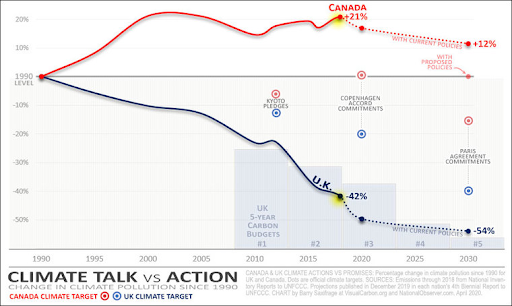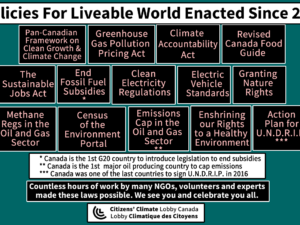VERSION ONE OF MANY TO COME (published July 8, 2020): Please note these ideas are still being formulated by Citizens’ Climate Lobby Canada. We will be looking to our members, Canadian Civil Society groups, and our parliamentarians to guide us as we collaborate to respond to the climate emergency and embrace the opportunities a just transition to a low carbon economy can bring to all Canadians. BACKGROUND: Many countries and jurisdictions including New Zealand/Aotearoa, Denmark (June 2020) and the United Kingdom (2008) have implemented climate accountability frameworks as a way of meeting their long-term climate commitments. Similar frameworks are also found in two Canadian provinces: Manitoba and British Columbia. These jurisdictions provide valuable examples for other Canadian governments looking to implement accountability frameworks. UK CLIMATE ACT + CONSIDERATIONS IN A CONFEDERATION: In 2008, the United Kingdom enacted the 2008 Climate Change Act which is a climate accountability framework. As the graph above clearly illustrates, the UK has been highly successful in reducing their carbon emissions. However, unlike the UK, Canada is a federation of provinces and territories and that must be considered when planning. CANADA, NGOs AND CLIMATE ACCOUNTABILITY: Since joining the United Nations Framework Convention on Climate Change (UNFCCC) Canada has never met a climate target. In May 2010, a Climate Accountability private member’s bill (Bill C311) passed through the House of Commons and was killed in the Senate without ever being read by a Conservative senator. Soon after Canada enacted the Greenhouse Gas Pollution Pricing Act, Citizens’ Climate Lobby (CCL) Canada volunteers collectively came to the conclusion that Canada needed climate accountability laws like the UK and began lobbying for them in May 2019. Fortunately, CCL Lobby Canada is not alone in its desire to see climate accountability laws enacted. Canada’s largest environmental law association, Ecojustice, the Climate Action Network Canada, the West Coast Environmental Law Association, Environmental Defence, the Pembina Institute, Equiterre and the Canadian Institute of Climate Choices are all working on climate accountability. BILL C215 – AN ACT RESPECTING CANADA’S FULFILLMENT OF ITS GHG EMISSIONS REDUCTION OBLIGATIONS KEY ELEMENTS OF CLIMATE ACCOUNTABILITY: Canada is a confederation and has a Westminster model of democracy. Thus, both must be considered when designing climate accountability laws. We want Canada’s climate accountability laws to look like we are in an emergency because we are in an emergency. There is also some valuable advice from Canadian NGOs to consider. Here are some general elements we think should be in a climate accountability law for Canada: Key Climate Accountability Resources LASER TALK: CCL Canada’s Climate Accountability Recommendations
Private Members bill, Kristina Michaud, Bloc Québécois MP for Avignon—La Mitis—Matane—Matapédia, QC
The purpose of Bill C-215 is to ensure that Canada fulfills its obligations under the Paris Agreement, including by establishing targets for reducing Canadian greenhouse gas emissions and accountability mechanisms for emissions reduction. More specifically, Bill C-215 includes a target of zero net emissions by 2050 and an interim emissions reduction target of at least 30% below the level of greenhouse gas emissions in 2005 by 2030. It also requires a centralized action plan that establishes five-year interim targets, from 2025 to 2040.
LASER TALK: CCL Canada’s Climate Accountability Recommendations
Home » CCL Canada News » LASER TALK: CCL Canada’s Climate Accountability Recommendations
LASER TALK: CCL Canada’s Climate Accountability Recommendations
Posted on November 8, 2020 in Laser Talk











